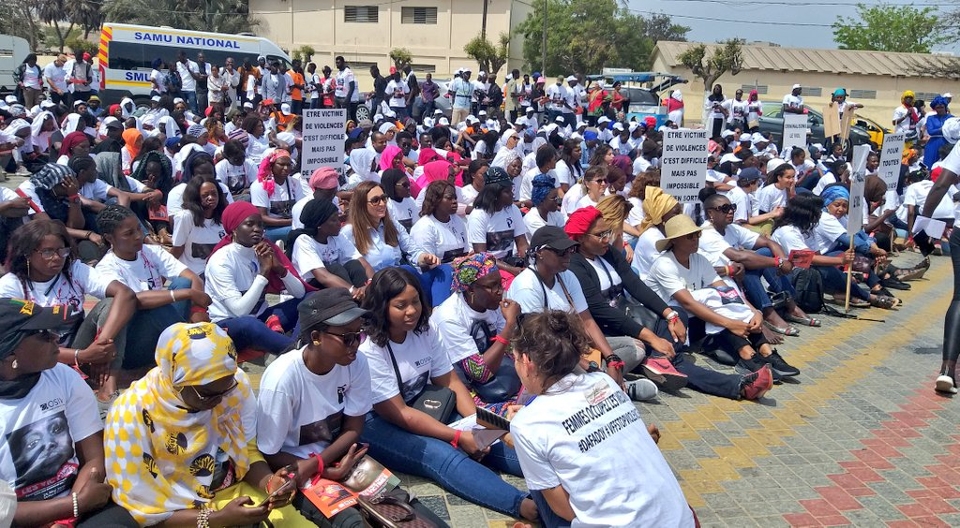In Senegal, When Women's Bodies Are Slayed, A Feminist Movement Emerges from Social Media Platforms

Photo Credit: Dafadoy Collective
By Emilie Diouf, IMPACT Leadership Circle Member
Enraged by the upsurge of violence against women, Senegalese women have lifted the veil of silence about atrocious forms of abuse. Their voices raise into a clamor to cry out, dafadoy[1], enough is enough. They join the faint echo of their foremothers across the continent who, several years ago, cried:
they are cutting up to pieces,
My body and my sun,
They are cutting them up into pieces…
They are Cutting everything up into pieces[2]
Ending violence against women in Senegal requires a multiplicity of voices capable of unveiling the different ways systemic social, cultural, economic, and political structures make women vulnerable. It is in this context that the Dafadoy Collective for Ending Violence Against Women and Children saw light on May 21, 2019. A hashtag on social media platforms became a coalition of several civil society organizations fighting for gender justice.
The collective’s members include lawyers, journalists, bloggers, artists, human rights activists, and sociologists, among others. They are spread across the 14 regions of Senegal. Dafadoy proposes policies to eradicate violence against women and children through an interdisciplinary approach that combines law, arts, and culture. It seeks to shift perceptions of women's role in Senegalese society and promote constructive dialogue among all actors. Since its creation, Dafadoy has worked with the Senegal's Ministry of Women, Family, Gender, and Child Protection to pass a law criminalizing rape on Dec. 30, 2019. The Collective went further by urging the Senegalese government to develop a national plan for eradicating violence against women. The plan has been both a road map and an accountability mechanism to measure the efficiency of adopted strategies between 2019 and 2024.
A year after the adoption of the National Plan for Eradicating Violence against Women and Children, Dafadoy co-convened with IMPACT and other Africa based organization, a virtual learning exchange on "Creative Responses to Gender Based violence across Africa" in September 2020. One of the focal points of this online conversation was the need to mainstream the prevention of sexual violence. Therefore, Dafadoy responded by launching several social media campaigns on rape prevention.
Despite the multiplicity of actions and initiatives following the Africa Learning Exchange, violence against women continues to be a harsh reality in Senegal, especially with the socioeconomic hardships stemming from the COVID-19 pandemic. Its disastrous consequences on the victims persist. These include lack of specialized care for victims among others. These are all reasons for launching an advocacy and awareness campaign in communities to involve them in actions aimed at preventing and denouncing rape, which remains a taboo issue in Senegal. Thus, with some support from IMPACT and the Open Society Initiatives for West Africa (OSIWA), Dafadoy is implementing a community project to improve awareness about various forms of gender-based violence in schools and neighborhoods. Like the rest of this planet, Senegalese society is in a whirlwind of socio-cultural transition; it is a time for women’s voices to reset the beat for social transformation. Let me end with the words by speculative fiction writer Mame Bougouma Diène:
What if we could?
We'd be a planet with a conscience. A planet that could guide life instead of suffering from it. When a new people are born to this world, they won't be blind like us humans were. Ravenous like we were. They will learn. From us.[3]
[1] Wolof term meaning enough is enough.
[2] Malika O'Lahsen (Algeria). “It Took One Hundred Years.” translated from the French by Eric Sellin. In Stella and Frank, Chipasula. The Heinemann Book of African Women's Poetry. Oxford, UK: Heinemann. 1995, p8.
[3] Mame Bougouma Diene. "Lekki Lekki" in Africanfuturism: An Anthology edited by Wole Talabi. Brittle Paper, Nov. 17, 2021